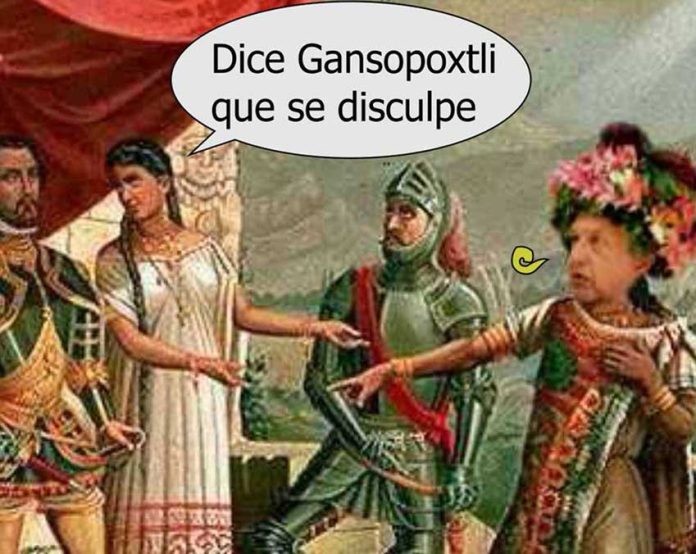While staying at a bed and breakfast in Guanajuato back during the George W. Bush administration, I chatted one morning over breakfast with some Canadian women.
Upon hearing I was from Texas, one of them said, “Really! Well, you Texans have a lot of apologizing to do”.
I was irked, of course, especially since I was (and am) a card-carrying liberal who had voted against and even protested against “W,” and who did these ladies think they were, anyway?
(Disclaimer: I have always been extremely jealous of Canadians, what with their national health care system and smooth social graces.)
President López Obrador’s proposal that Spain owes Mexico an apology for the conquest (and while we’re thinking about apologizing, the Catholic church to the country’s indigenous population) has me thinking about that incident once again. How responsible are we for our past, or for the place and culture that we come from?
“Let bygones be bygones” seems to be built into Mexican culture, possibly out of necessity: if you’re an hour late, they’re at least happy that you made it; if you had a huge fight the last time you were together, well, that was a while back, and maybe a beer and a party will help.
Mexicans don’t seem to spend a lot of time sitting around dwelling on past hurts, which is one of the things I love about them.
That said, there are quite a few “bygones” to get over when it comes to the conquest. Through disease, murder and, as some now believe, a pair of very inconveniently-timed droughts, the indigenous population was decimated.
Alliances with tributaries to Tenochtitlán and the subsequent battles against the Aztecs crippled many indigenous cultures, and weakened status and forced labor became the name of the game for many that were left.
There were plenty of indigenous people, of course, who helped Spain put an end to the Aztec empire. I wonder, if they could see the centuries of after-effects of that, if they’d have made the same decision.
While Cortés and his men were busy with physical conquest, Spanish missionaries set to work winning over the hearts and minds of the populace, though not always peacefully. Through oftenforced “re-education,” the indigenous learned to at least make a show of worshiping the Christian “gods.”
The church was particularly good at comparing saints to already-established indigenous gods, and I often like to imagine them walking to church to pray to “la virgen” (cough-Tonantzín-cough-cough), though my fantasies of subversion could quite possibly be pure imagination.
Though a number of people make a point of honoring their indigenous roots, for the most part, day-to-day indigenous life is decidedly uncool and backwards to most. We celebrate festivities, we love the costumes, we still say “guajolote” for turkey and start sentences with “when they conquered us . . .”
We also consistently find European features to be more attractive than indigenous ones, and it’s obvious that there’s a pretty strong correlation between skin color and socioeconomic status. Grandmothers jokingly encourage their children and grandchildren to “mejorar la raza” (improve the race), and like in most other places of the Americas, the indigenous population is the poorest, the least educated and the most consistently abused and exploited.
The more they can conform to the culture of their conquerers, the better off they do, and this is as true today as it was 500 years ago.
My Facebook feed for the past couple of days has been filled with jokes about AMLO’s request, but I’d argue that apologies for things that happened long ago in which the perpetrators were entire countries are not unprecedented: Germany apologized for the Holocaust, Tony Blair apologized for England’s role in the potato famine of Ireland and former Prime Minister Rudd of Australia apologized for the country’s role in “the lost generation” (the unfortunate habit of white settlers stealing indigenous children).
I’ve apologized for many wrongs, intended and not; it’s not a hard thing to do, and it’s healing both for the wronged party and for the released guilt of the perpetrator.
Much to my dismay, AMLO’s detractors have done a fairly good job at making him seem like one big joke. I’ll admit that he’s eccentric and fixated on his self-appointed tasks enough that he doesn’t always help himself recover in that department.
It’s true, there are plenty of pressing matters that are more important than obtaining a 500 years-too-late apology from the country your own culture has been inextricably blended with and the church that over 90% of your citizens now belong to. But why not apologize anyway? Is it so undignified?
As for myself, I officially apologize, on behalf of the state of Texas, for giving the country George W. Bush as president. That said, not everything he did was terrible, and to grow means to accept that even one’s enemies and rivals make good points sometimes.
On the occasion of apologizing for the Japanese internment camps during World War II, Bush said, “No nation can fully understand itself or find its place in the world if it does not look with clear eyes at all the glories and disgraces of its past.”
So hey, New York! Now it’s your turn — apologize for giving us Trump!
Sarah DeVries writes from her home in Xalapa, Veracruz.
